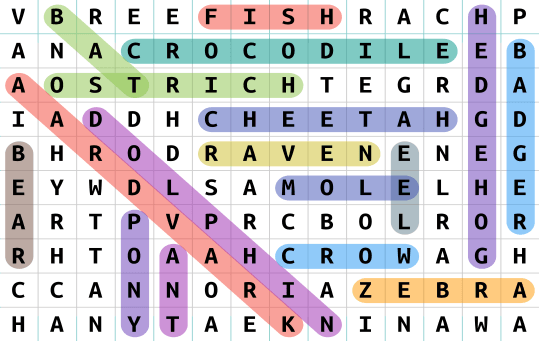The Fascination With Hidden Puzzles
It wordsearch is a puzzle format that has entertained people of all ages. These grids filled with letters challenge players to spot hidden words arranged in multiple directions. The attraction lies in their simplicity and universal appeal. Anyone can start solving without advanced skills, making them a favorite in classrooms, magazines, and apps.
- The Fascination With Hidden Puzzles
- Boosting Cognitive Flexibility Through Play
- A Source Of Stress Relief
- Linking Language Skills And Entertainment
- Educational Settings That Inspire Learning
- The Rise Of Digital Brain Games
- Simple Tips To Improve Speed
- Balancing Leisure And Productivity
- Why Families Enjoy Group Challenges
- Expanding Creativity Beyond Letters
- The Role Of Memory Development
- Different Themes Keep Challenges Fresh
- Overcoming Common Struggles
- Community And Competition Around Games
- Integrating Puzzles Into Daily Routines
- The Future Of Puzzle Innovation
- Final Thoughts On Lasting Appeal
Boosting Cognitive Flexibility Through Play
Word puzzles are more than pastimes; they serve as brain workouts. Searching for terms trains the eyes and mind to recognize patterns quickly. This action strengthens mental flexibility, allowing individuals to switch between tasks effectively in everyday life. Regular exposure can make problem-solving feel more intuitive.
A Source Of Stress Relief
Many people turn to puzzles as a calming escape. The repetitive search and gradual discovery provide comfort. Concentrating on small goals within the grid draws attention away from stressors. Over time, this becomes a mindful practice that supports emotional balance.
Linking Language Skills And Entertainment
Word games enhance vocabulary by exposing solvers to new terms. When players hunt for unfamiliar words, curiosity often leads them to learn meanings. This builds language competence without pressure. For learners of a second language, such puzzles bridge the gap between education and enjoyment.
Educational Settings That Inspire Learning
Teachers have long used word puzzles to make classrooms more dynamic. Students remain engaged while practicing spelling, memory, and recognition. Lessons feel less like obligations and more like interactive challenges. Such methods reinforce retention because information connects with enjoyment.
The Rise Of Digital Brain Games
Technology has expanded puzzle solving beyond paper. Apps and websites deliver endless grids customized by difficulty or theme. Players can now compete with friends globally, track progress, and unlock achievements. The shift to digital has increased accessibility and made puzzle play more social.
Simple Tips To Improve Speed
Many solvers aim to complete grids faster. One effective method is to scan rows and columns rather than focus on single letters. Another strategy is to search for uncommon letters like Q or Z that narrow possibilities. Consistency in practicing these techniques develops quicker recognition over time.
Balancing Leisure And Productivity
Word puzzles strike a unique balance between relaxation and productivity. Solving them during breaks refreshes the brain while still providing a sense of accomplishment. Unlike passive entertainment, puzzles engage cognitive effort. They are a middle ground that combines rest with skill growth.
Why Families Enjoy Group Challenges
Shared puzzle solving creates bonding opportunities. Families often sit together with one grid, collaborating on discoveries. This promotes teamwork and communication across generations. Even younger children feel included because every contribution matters. These moments become lasting traditions that strengthen relationships.
Expanding Creativity Beyond Letters
Engaging with puzzles can inspire broader creative thinking. Spotting patterns in grids translates into seeing connections in unrelated tasks. This fosters innovation in school projects, artistic endeavors, and problem-solving at work. Creative stimulation emerges naturally when the brain learns to search in unconventional ways.
The Role Of Memory Development
Memory improves when repeatedly exposed to letters and words. The act of scanning and remembering potential placements stimulates the brain’s retention ability. Students and adults alike benefit from this consistent memory training. Over time, recall sharpens not just in puzzles but in everyday scenarios.
Different Themes Keep Challenges Fresh
Variety prevents boredom in puzzle play. Grids can revolve around animals, geography, science, or pop culture. Each theme introduces unique terms, expanding knowledge while maintaining entertainment. This thematic flexibility ensures long-term interest in the activity.
Overcoming Common Struggles
Beginners sometimes feel overwhelmed by large grids. Breaking the puzzle into sections makes the task manageable. Highlighting found words also reduces confusion. With these simple adjustments, confidence grows and puzzles feel less intimidating. Progress is steady when the process becomes organized.
Community And Competition Around Games
Communities have formed around a shared love of puzzles. Online groups exchange tips, design challenges, and celebrate achievements. Competitions encourage faster solving and creative puzzle design. These interactions turn a solitary hobby into a collective passion, increasing motivation.
Integrating Puzzles Into Daily Routines
Fitting puzzles into daily life is simple. Some solve a small grid with morning coffee, while others play during commutes. Short sessions keep the brain active without demanding long time commitments. This flexibility makes word puzzles adaptable for all lifestyles.
The Future Of Puzzle Innovation
Advancements in artificial intelligence and interactive design promise even more exciting developments. Personalized difficulty settings, immersive experiences, and themed adventures are emerging. These innovations keep the classic puzzle alive while pushing boundaries of engagement.
Final Thoughts On Lasting Appeal
The universal charm of puzzles continues to endure across generations. They remain relevant because they combine education, entertainment, and self-improvement. Whether on paper or digital platforms, their influence persists. The journey of discovery inside each grid mirrors the joy of learning itself.



